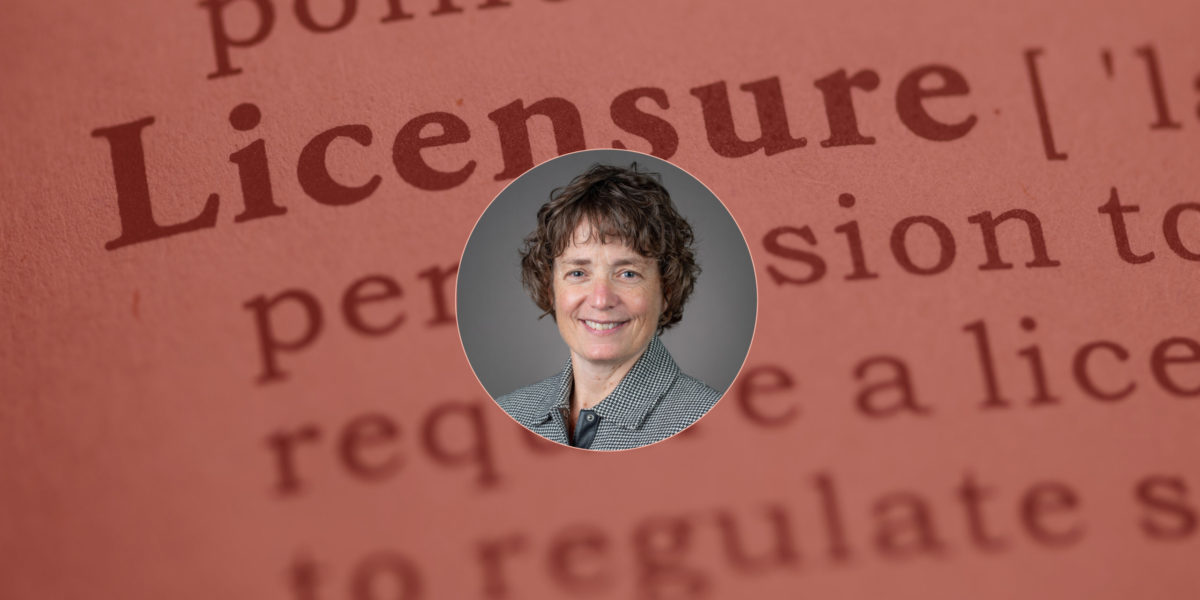Given the changing landscape of the legal profession, Dean Jackie Gardina, Ed.D., J.D., calls on the California Supreme Court to explore alternatives to determining readiness to practice law.
In May of 2023, The Blue Ribbon Commission on the Future of the California Bar Exam (BRC) released its final report and recommendations to the State Bar of California Board of Trustees. The commission, a joint effort between the California Supreme Court and the state bar, was tasked with developing recommendations concerning changes to the California bar exam and whether to adopt alternative pathways, additional testing, or tools to ensure minimum competence to practice law.
This charge was to follow up on the findings of the California Attorney Practice Analysis Working Group (CAPA), which identified the knowledge, skills, and abilities (KSAs) needed by entry-level attorneys in California to practice law ethically and competently. Under consideration were two separate paths to licensure—a bar exam and an alternative pathway. Ultimately, the commission did not reach a consensus on exploring an alternative pathway to licensure that does not involve a bar exam.
However, the Board of Trustees of the State Bar of California Board of Trustees continues to recognize the importance of starting an alternative pathway to licensure. On May 19, 2023, the Trustees directed members who supported an alternative pathway to submit a proposal for consideration.
As noted throughout the work of the BRC, such alternatives could include requiring law graduates to practice under the supervision of an experienced lawyer or requiring specific coursework in law school. This presents a critical opportunity to increase the focus on assessment of knowledge, skills, and abilities for entry-level practice, deemphasizing the need for memorization of doctrinal law.
Knowledge, Skills, and Abilities in Law
Currently, the California bar exam does not reflect the KSAs necessary for new attorneys. Indeed, until 2018, California had never even assessed whether the content of the bar exam reflected what new attorneys did in practice. Even more astounding, California had chosen the 1440 passing score without any evidence to support that it was the score necessary to establish minimal competence. Thousands of bar applicants were failing to meet the standard of minimal competence when minimal competence in California had never been established through any studies.
The ability of standardized exams to measure skills or concepts is dubious. For example, the National Conference of Bar Examiners’ job analysis study found that legal research is the most important skill for new attorneys. Yet, it is not tested. Additionally, a standardized test cannot measure negotiation skills or assess work produced for clients.
Moreover, the legal profession is in flux. What lawyers need to know and what skills and abilities they need to have will change rapidly. There is a mismatch between an exam designed to meet the needs of an industrial economy and a test of competency necessary to meet the needs of a rapidly evolving knowledge economy. Using the same examination format introduced 100 years ago is inadequate to assess the competency of a 21st century attorney.
It’s time to consider alternatives to a standardized exam that has limited value in determining who is prepared to enter the profession as a skilled, competent, and ethical attorney. Even if an exam is necessary to establish foundational knowledge, it is ill-suited to assess many other skills and abilities.
Assessing Professionals for the Future of Legal Industry
In 2018, the California Practice Analysis Working Group (CAPA) surveyed California attorneys to discover the KSAs needed by new attorneys, defined as those in their first three years of practice. Any alternative pathway must assess the bar applicants on the knowledge, skills, and abilities necessary for new attorneys as identified by the CAPA Working Group.
Jim Henderson, Ph.D., who served as a consultant to help design the surveys for CAPA and later was invited to join the BRC, stated that a supervised pathway to practice alone may be insufficient to assess breadth of knowledge, although sufficient to assess general skills and abilities. Thus, an alternative pathway to licensure may need to include an exam or other assessment of knowledge. Questions regarding the adequate assessment of the KSAs will need to be addressed in any exploration of an alternative pathway to licensure.
It is important to acknowledge that California has already implemented a temporary alternative pathway to licensure.
In 2020, in response to the COVID-19 pandemic, the Supreme Court directed the State Bar to create a Provisional Licensure Program (PLL) for 2020 that granted law graduates a limited license to practice law under the supervision of fully licensed attorneys. To become fully licensed, however, they must pass the bar. The following year, this provisional program was expanded to a pathway programs for individuals who scored between 1390 and 1439 on the bar to become licensed through supervised practice. While both of these provisions have been extended to December, 2025, they are not permanent and still rely on law graduates either taking or passing the bar to ultimately become fully licensed.
The BRC heard from both the provisionally-licensed attorneys and their supervisors during our discussions. While the State Bar has begun to study the PLL program and its participants, the BRC did not have access to the data during its deliberations. The PLL data will be relevant to any exploration of an alternative pathway to licensure.
To be sure, many questions and concerns need to be addressed such as the validity, reliability, and fairness of any measure of competency, as well as concerns about equity. But these issues, and others raised throughout the debate, can be vetted during the next stage in the process. Any proposals for an alternative pathway would need to be submitted for further review and approval.
In the end, advancing the exploration of an alternative pathway is low risk and high reward and should be pursued without delay for California to keep pace with the evolving landscape of the legal profession.
To learn more about our legal degree programs, fill out the form below.

